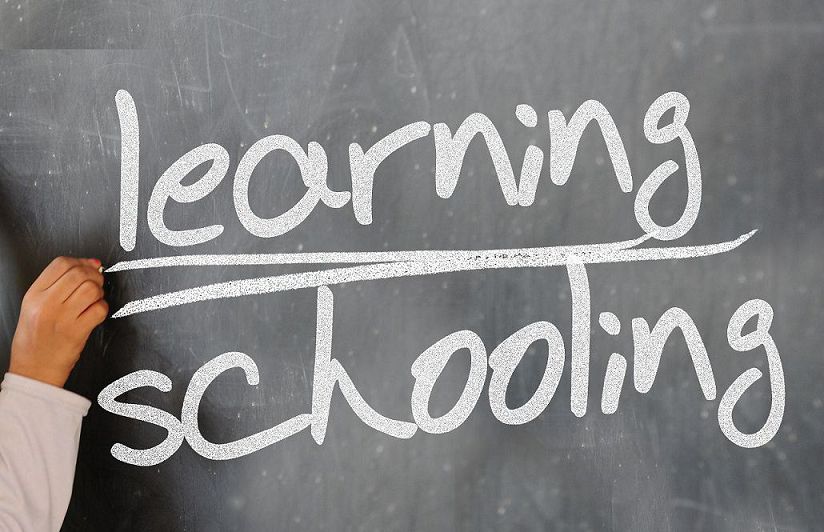It’s no secret that parents play a huge role in their child’s life. What you do directly affects your children, and in turn, their adulthood. So what are some common characteristics of parents with A+ students? We’re educators ourselves and have a keen interest in helping children have the best chance at a successful future. So in this article, we’ll take an in-depth look at the behind-the-scenes parenting of successful children.
Don’t recognize all of the below in yourself? It’s never too late to start integrating some of these tips into your life to benefit both you and your child!
Let your children fail
As much as you may want to shelter your child, letting them make mistakes are important. Most parents choose to protect their children in order to save them from distress. In your eyes, you may have learned from your own mistakes and recognize how to prevent it. By not allowing your child to fail, they may avoid doing a certain action but never know why. Parents who allow their child to try something out themselves and then later realize it was wrong helps ingrain the experience into their learning.
Children don’t naturally have a fear of failure. They associate fear with the negative reactions from parents or adults around them when they fail. That’s why we get embarrassed or feel ashamed when we do something wrong. While your child is still young, let them fail. Keep them safe to a reasonable degree, but there’s no need to be overly negative in order to keep them from doing something wrong.
In Dr Eveline Crone’s study where eight- and nine-year-olds were observed, she found that negative feedback is not at all helpful for children who are under the age of 12. This starts changing as children grow up, but while your child is still young, let them fail! Through failing, your child will gain knowledge and confidence—and they’ll thank you for it in the future.
Set high expectations
Every parent has imagined an ideal future for their children. But studies have found that these expectations differ between the parents of successful students and those whose children don’t score as high. What expectations should you set on your child to help them do better in school?
In a study that looked at the socioeconomic status of families and their impact on a child’s learning, it was found that parents who had higher expectations for their children were important in shaping their grades. Parents who expect that their children will go to college helped most with their child’s early learning. That’s why it’s suggested that kids are exposed to higher expectations so that they’re encouraged to learn more.
If you were to step back and see it from the other side, if someone believed in your abilities to achieve something great, how would you feel? You’d likely gain confidence, try harder, and seek new ways to fulfill that vision.
Of course, be realistic with your expectations. There is a fine line between encouraging expectations and unattainable ones that will discourage them from trying from the start. Be fair and be supportive and know that your child has the potential to do well!
Give them chores!
As times change, chores aren’t seen as a must in the household anymore. In the past, it was natural for children to help out around the house. With the rise of electronic appliances that take care of washing the dishes, drying our clothes, and even automatically vacuuming the house, it seems that there’s less and less for children to help out with.
It may seem counterintuitive, but parents of A+ students give their children chores. Will chores cut into their studying time? Not if the amount of chores given is reasonable!
Children are known to be impulsive and lacking in judgement. Chores actually help to reduce both of these. Research has shown that children who are responsible for a set of chores are more responsible, manage frustration better, and have higher self esteem—all of which contribute to great success in school.
After outlining a set of chores for your child, enforce that they’re carried out. It shouldn’t be treated lightly so that your child understands it’s their responsibility. They’ll learn to integrate it into their schedules so they can finish both their course work and their chores. Along the way, you’ll find that their time management skills will improve too!
Learn math early on
Math is a key subject taught all through early education, and many colleges and universities require it in post-secondary as well. Its importance is obvious, but how can it help your child? It turns out math is a key indicator of achievements later on in life!
When several factors were looked into for their significance on school readiness and later achievement, the major predictors of success placed math first. Reading and attention came after, so don’t forget about those either, but math had the greatest predictive power.
Math may not come naturally for everyone, so what can you do to ensure your child has a good start to their path to education? Exposing them early to math and numbers is a good first step. If your child runs into issues as they learn math in school, such as through their homework or tests, let them know that they’re not in this alone. Support is key in helping them realize there are alternatives if they’re falling behind.
There’s tutors, but it’s important to find someone who’s the right fit for your child and within your budget. You may also look into finding workbooks if your child is able to do self-guided learning. Luckily, if you wanted a combination of the two, there’s online help sites that can teach through videos and also provide practice problems with solutions for your child. You may want to take a look at Studypug!
Don’t over-praise your kids
There’s nothing like seeing your child succeed that fills you with more pride, and it’s always important to let them know you recognize their efforts. But when does your praise go over the top?
It turns out that reasonably supporting your child is optimal when it comes to helping them with academic achievements. Parents of top students are careful not to over-praise their child’s work. Dr. Carol Dweck, a developmental psychologist at Stanford did an experiment asking children to solve simple puzzles. She found that children who weren’t told they were smart were motivated to try harder puzzles than those who were told they were bright and gifted.
Over-praising your children can lead to shaking their confidence. The reasoning behind this is that with higher praise, they develop a fear of trying new things. New things and harder challenges can be seen as a risk in them losing their title as being smart. Your praise could be doing more damage than you originally thought.
Talk about school
Your children shouldn’t feel that they’re the only ones in the household who is linked to schooling. It’s important that there are home discussions on school activities and programs! Hopefully, taking an interest in your child’s education naturally leads to these discussions, but if not, be sure to ask plenty of questions to check in on how your child is doing.
In a study that looked at 25,000 U.S. students, it found that parents who talk about school after school was off for the day had a huge impact on academic achievement. You shouldn’t think that education is only the school’s responsibility. Of course, not all families are fortunate enough to have plenty of time to discuss what happens at school, but you should make an effort to know what’s going on in your child’s life during the 7 or so hours when they’re at school. Take the discussion further to learn what your child would like to do in the future, and try to tie that in with what they’re doing now.
The importance of parents’ participation in their child’s education and expressing their support cannot be trivialized.
Work outside the home
While you may be worried that not having an around-the-clock parent be available for your child can harm them, it’s actually the opposite! Families where mothers work outside the home lead to children who complete more years of education and had higher employment rates.
For daughters with working moms growing up, they earned 23% more than their peers who had stay-at-home mothers. For sons who saw their mom working a job while they had school, they had different attitudes towards domestic chores and labour. These sons would later grow into men who would help out more with household duties and childcare.
Being a parent in a family where everyone has external responsibilities outside of the household encourages everyone to help with household duties, and promotes better planning. This in turn has led to improved grades in school and nurturing children who take more responsibility for their learning.
Of course, don’t expect your child to have to worry about being alone and having to take care of everything themselves. Split chores fairly and know that there’s still responsibilities (e.g. giving them a ride when they have to bring a large project to school) that you will have to take up so your child can focus on learning.
Make time to read together
Earlier on, we touched on how reading plays a significant part in a child’s learning abilities later on in life. While some parents go to extremes (such as Dr. Ben Carson’s mother making him read every day and then provide her with a summary), reading should not be overlooked. A good way to encourage reading is to read together with your kids.
Set aside time to read with your children. At earlier ages, reading aloud together helps build strong oral language skills which greatly helps their literacy at earlier years. As you progress with them, you can move on to silent reading if you wish. This will allow you to read your own book, while your child is free to read theirs. Setting aside that time is the most important part to make reading a part of their daily lives.
Since reading is one of the main foundations for education, you’ll be helping your child start off with their best foot forward.
Respect educators
When a study was done to look into why Asian kids were frequently scoring at the top of their class, it was found that these children were taught at an early age to respect their educators.
Being a student may not always be the most exciting, especially when the courses aren’t always geared towards what children are interested in, but instead at what is important for them to learn. Instilling respect for teachers in your children helps greatly in their learning. Without that respect, children will find it hard to trust their teachers or find that they want to learn from them. They will not see the importance of being taught something if the person they’re learning from aren’t seen as knowledgeable authority figures.
You don’t have to be Asian to put this into practice. Portraying teachers and educators as people who are genuinely trying to help your child will help them be more receptive to their lessons. The teacher may not always be right, so encouraging a healthy sense of curiosity is good, but your child needs to embrace their role as a student who is at school to learn.
Be a good role model
What is the last habit that parents of students at the top of their class share? These parents are good role models. Let’s face it. No one is perfect, and you don’t have to feel the need to be either. You may have bad habits, but telling your children to “do as I say, not as I do” is not going to magically help them become better people.
Practice what you preach. If you set high goals for your children, make sure they know that you hold yourself to a high standard too. Stay true to what you encourage your children to do. Don’t think that they should stay up all night watching television? You shouldn’t either.
It doesn’t matter that you haven’t always been the perfect citizen. It’s about starting to be the best person that you’ve ever been as your child grows up so they can learn from you, and pick up good habits along the way. You just may find your confidence going up and adopting some healthy habits while doing so!
With all these important habits of good parenting explored, you may find that there’s a few good pointers that you can leave with to help boost your child’s education. Don’t feel that you have to change your life completely overnight. Just reading this article all the way to the end shows that you truly care for your child and want what’s best for them.
Does your child need a little help in terms of math? We’re experienced educators in mathematics, and comprehensively cover your child’s curriculum. Let us support your child’s math journey so you can focus on the other aspects of their lives and education. Check out StudyPug’s affordable packages, and try now.
















